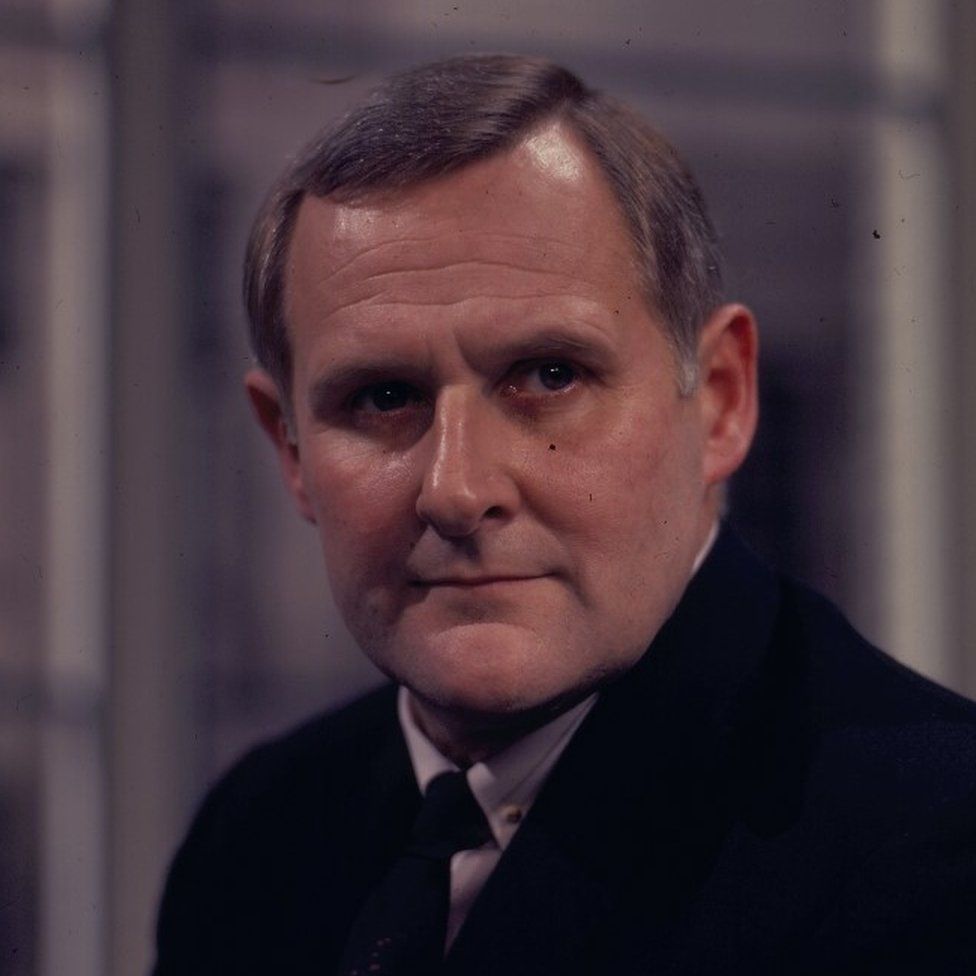Obituary: Peter Vaughan
- Published

Actor Peter Vaughan, who has died aged 93, seldom played leading roles.
But in a career lasting seven decades he became an ever-present figure on stage, screen and television.
He cut his teeth in the theatre where he specialised in police officers, secret agents and excelled in roles as the menacing villain.
But he gained a wider audience with his TV roles, notably in the sitcoms Porridge and Citizen Smith and drama series Our Friends in the North.
Latterly he was in the hugely successful Game of Thrones series, in which he played elderly, blind Maester Aemon of the Night's Watch.
He was born Peter Ohm on 4 April 1923 in the small market town of Wem in Shropshire.
His father worked at a local bank while his mother was a nurse.
His parents did not have a happy marriage and Vaughan spent his adolescence as something of a loner, an experience that left him emotionally repressed.
He attended Uttoxeter Grammar School before joining Wolverhampton Repertory Theatre in what would prove to be a long stint in touring theatre.
It was interrupted during the war when he was called up to the army and saw service as an officer in Normandy and Belgium, an experience he later described as terrifying.
He was transferred to the Far East, where he witnessed the liberation of allied prisoners of war from the appalling conditions in Singapore's Changi jail.
Resentment
"It was a strange way, between the ages of 18 and 24, to form a character. I think I was in a daze when I came back to Britain. It took me a while to come to terms with it."
He went back into the theatre after the war playing dozens of minor roles in as many theatres.
He also married an up-and-coming young actress called Billie Whitelaw in 1952.
The relationship was not a success, although the couple stayed together for more than a decade.
However, Vaughan found it impossible not to feel resentment at his wife's increasingly high profile as an actress.
"As I got more and more work, Peter's difficulty in dealing with this was starting to show," Whitelaw later wrote. In turn, she had a series of affairs.
Vaughan made his first - and uncredited - film appearance in a version of The 39 Steps in 1959, where he played a policeman.
Breakthrough
A critic once said that Vaughan could convey menace reading a weather forecast and he used this to good effect in a string of films.
"In terms of the parts I played, I think my face had more to do with it. Clearly I wasn't ever going to play romantic leads."
In the 1964 film Smokescreen, he finally topped the cast list, and came to the notice of the critics, in his role as an insurance investigator.
In the same year he made his London stage breakthrough, playing Ed in Joe Orton's Entertaining Mr Sloane at Wyndham's Theatre. He recalled Orton as a complete one-off.
"If I asked him about a line, he'd tell me it means whatever I want it to mean."
He and Billie Whitelaw divorced in 1966 and Vaughan later married the actress Lilias Walker.
Annoyance
During the 1970s he began to appear more on television. He excelled as Mr Paxton in the 1972 BBC adaptation of the MR James ghost story A Warning to the Curious.
Two years later, he played the menacing criminal mastermind, "Genial" Harry Grout, in the BBC sitcom Porridge.
It was a measure of the strength of his performance that many people assume he actually appeared in more than the three episodes in which his character featured.
This became something of an annoyance to Vaughan, who disliked being remembered solely for the role.
Later he played the authoritarian father of Robert Lindsay's girlfriend in the first two series of the comedy Citizen Smith.
In 1980 he was Billy Fox, the head of the gangland family in Thames Television's groundbreaking series, Fox.
Acclaim
And he played the part of Denethor in the BBC's much-acclaimed radio adaptation of The Lord of the Rings in 1981.
The director, Terry Gilliam, was so taken with Vaughan's performances that he cast him as the ogre in his film Time Bandits and later as Mr Helpmann in Brazil.
He was a frequent figure in many costume dramas including BBC adaptations of Bleak House and Our Mutual Friend.
The role for which he received most acclaim was as William Stevens in the film adaptation of The Remains of the Day.
The old butler's attention to detail perfectly summed up Vaughan's own approach to his craft. His meticulous preparation for his roles became famous.
When cast in the BBC drama Our Friends in the North, as Felix Hutchison, who eventually develops dementia, Vaughan spent hours in a home for people with Alzheimer's.
"One wants to be real above all things," he later said. His performance won him a Bafta nomination for best actor.
As he entered his eighth decade, the roles kept coming. He appeared in a number of films in the first decade of the new century including Death at a Funeral in 2007.
At the age of 86, he portrayed Maester Aemon of the Night's Watch in the HBO TV blockbuster Game of Thrones. His character was blind, an affliction that mirrored Vaughan's own failing sight.
"I have always approached every part I have done as if it will be my last," Vaughan once said, "and that it's the one I will be judged by."
Follow us on Facebook, on Twitter @BBCNewsEnts, or on Instagram at bbcnewsents. If you have a story suggestion email entertainment.news@bbc.co.uk.
- Published6 December 2016